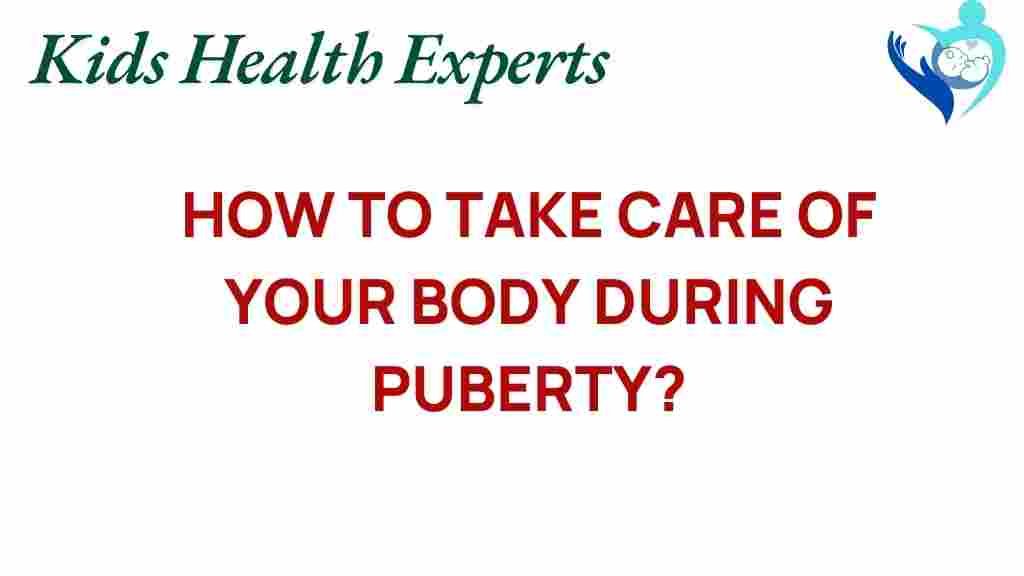Puberty is a significant phase in life, marking the transition from childhood to adolescence. During this period, various changes occur in the body, affecting not only physical appearance but also emotional wellbeing. Understanding how to care for your body during puberty is crucial for fostering a healthy transition. This article provides essential health tips, focusing on body care, nutrition, hygiene, and self-care to navigate this transformative time effectively.
Understanding Puberty
Puberty typically begins between ages 9 and 14 and can last several years. During this time, the body undergoes rapid growth and development. Hormonal changes lead to various physical and emotional changes, which can sometimes feel overwhelming. Recognizing these changes and knowing how to care for your body can help ease the transition.
The Importance of Body Care During Adolescence
As you navigate puberty, focusing on body care becomes essential. Here are some key areas to concentrate on:
- Growth: Your body will experience growth spurts, and understanding this process can help normalize your experiences.
- Nutrition: A well-balanced diet supports your body’s development and energy needs.
- Hygiene: Changes in body odor and skin can occur, making personal hygiene practices more important than ever.
- Emotional Wellbeing: Hormonal fluctuations can affect your mood, making it vital to practice self-care and seek support when needed.
Essential Health Tips for Puberty
Here are some essential health tips to keep in mind as you navigate puberty:
1. Prioritize Nutrition
Nutrition plays a critical role in supporting your body during puberty. Consider the following:
- **Eat a balanced diet** that includes fruits, vegetables, whole grains, lean proteins, and healthy fats.
- **Stay hydrated** by drinking plenty of water throughout the day.
- **Limit processed foods** and sugary snacks to maintain energy levels and overall health.
- **Consider supplements** if necessary, but consult a healthcare provider first.
2. Maintain Good Hygiene
With the onset of puberty, personal hygiene becomes increasingly important:
- **Shower regularly** to keep your skin clean and reduce body odor.
- **Use deodorant** to help manage perspiration and odor.
- **Practice oral hygiene** by brushing and flossing your teeth twice a day.
- **Take care of your skin** by cleansing daily and using appropriate products for your skin type.
3. Engage in Regular Physical Activity
Physical activity is vital for overall health during puberty:
- **Aim for at least 60 minutes of exercise** each day, which can include sports, walking, biking, or dancing.
- **Strength training** can also be beneficial, but focus on proper form and techniques.
- **Join group activities** or sports teams to stay motivated and meet new friends.
4. Focus on Emotional Wellbeing
Emotional changes are common during puberty due to hormonal fluctuations:
- **Practice mindfulness or meditation** to help manage stress and anxiety.
- **Talk to someone you trust**, like a parent or counselor, if you feel overwhelmed.
- **Keep a journal** to express your thoughts and feelings.
- **Engage in hobbies** that you enjoy to boost your mood and self-esteem.
5. Get Enough Sleep
Sleep is essential for growth and development:
- **Aim for 8-10 hours of sleep each night** to support your body’s changing needs.
- **Establish a bedtime routine** to help signal to your body that it’s time to wind down.
- **Limit screen time** before bed to improve sleep quality.
6. Stay Informed
Knowledge is power when navigating puberty:
- **Educate yourself** about the changes your body is going through.
- **Read books or reliable online resources** about puberty and health.
- **Ask questions** to trusted adults or healthcare providers to clear any doubts.
Troubleshooting Common Concerns
Despite taking care of yourself, you may encounter some challenges during puberty. Here’s how to address common concerns:
1. Skin Changes
Acne and other skin changes are common during puberty:
- **Use gentle cleansers** and avoid harsh scrubs that can irritate the skin.
- **Consider over-the-counter treatments** containing benzoyl peroxide or salicylic acid.
- **Consult a dermatologist** if acne persists or worsens.
2. Mood Swings
Emotional fluctuations are normal, but they can be challenging:
- **Practice coping strategies** like deep breathing or talking to someone you trust.
- **Engage in physical activity** to help improve your mood.
- **Reach out for professional help** if feelings of sadness or anxiety become too overwhelming.
3. Peer Pressure and Social Changes
Adolescence often brings new social dynamics:
- **Stay true to yourself** and your values, even if it feels challenging.
- **Surround yourself with supportive friends** who uplift you.
- **Learn to say no** to situations that make you uncomfortable.
Conclusion
Navigating puberty can be a complex journey filled with changes in your body, emotions, and relationships. By focusing on body care, nutrition, hygiene, and emotional wellbeing, you can make this transition smoother and healthier. Remember, it’s okay to seek help and talk about your experiences. Embrace the growth and changes that come with adolescence, and prioritize your health and self-care.
For more information on puberty and health, you can check out this resource. If you have specific concerns, consider reaching out to a healthcare provider who can guide you through this exciting time.
This article is in the category Care and created by KidsHealthExperts Team
